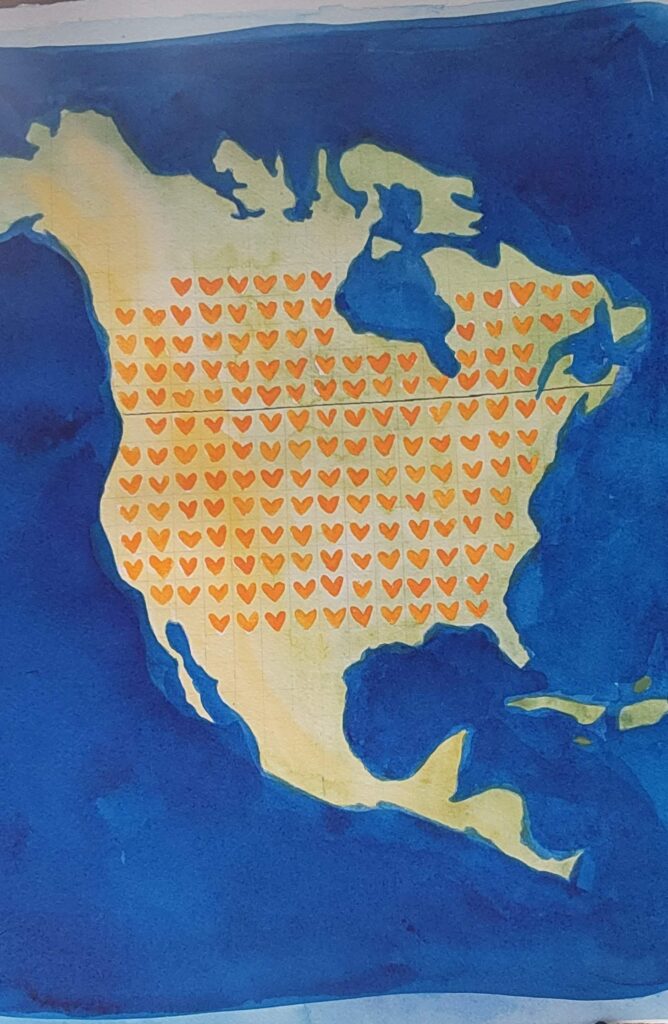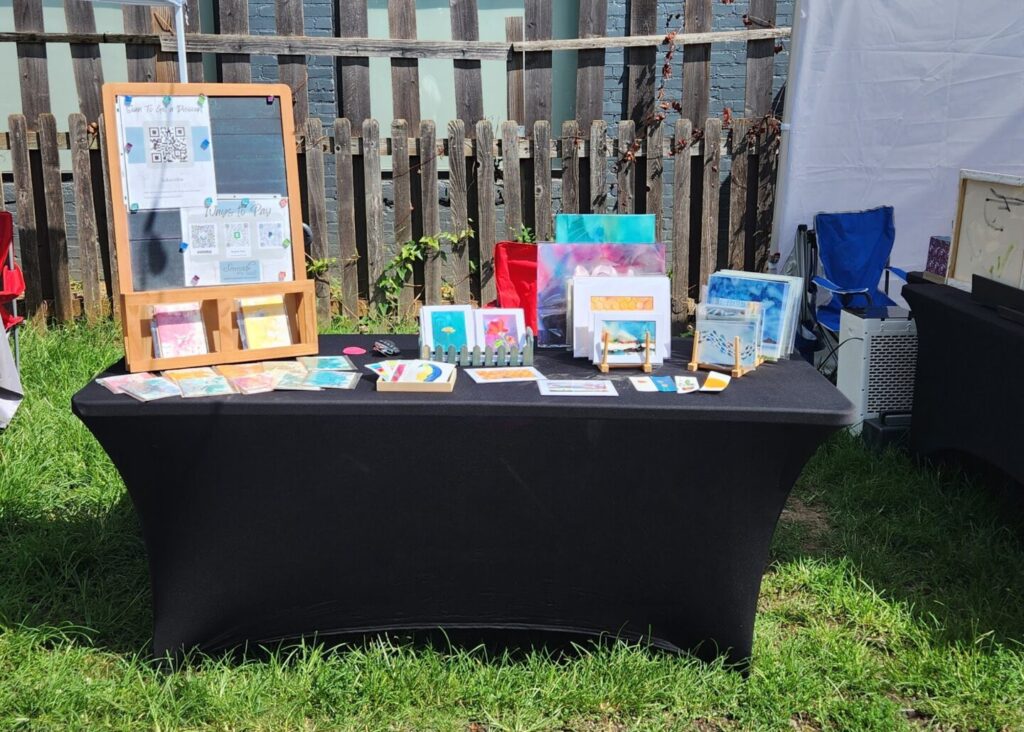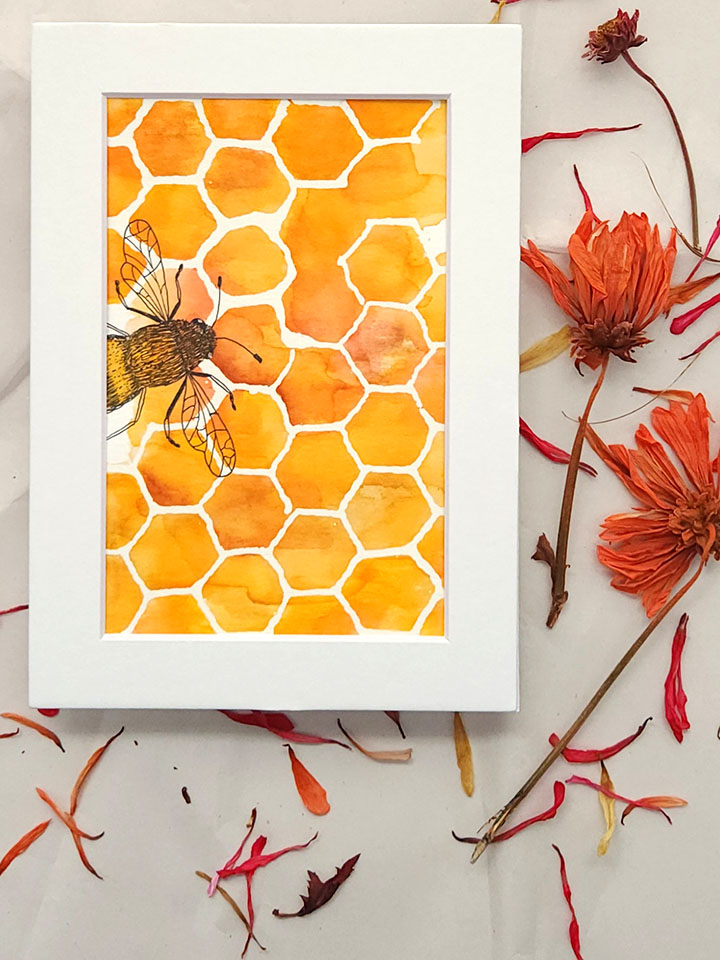Each heart on this painting symbolizes 10 kids found in unmarked graves at Residential Schools across North America.
If the discovery of these graves has moved you to support and fight for Indigenous communities, consider extending your awareness to the ongoing crisis of Missing and Murdered Indigenous Women (MMIW).
Educate yourself on both issues; they are interconnected chapters of injustice. There are many ways to help—stand with us, demand justice, and support resources for protection and prosecution. Together, we can make a difference. 🤎
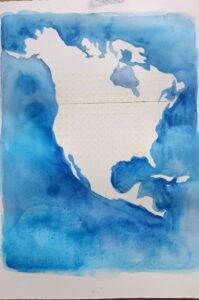
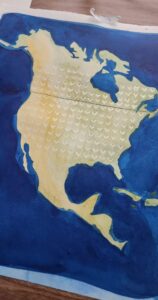
When I was younger, I found the idea of Native Americans and Pilgrims sharing a meal heartwarming, but I didn’t grasp the complexities behind their history. As I learned about their forced displacement, the atrocities committed against them, and the deliberate destruction of their food sources, it became clear how cruelty could prevail in the pursuit of greed and power. The historical narrative, marred by violence, disease, and discrimination, revealed a dark side that unsettled me profoundly.
My awareness deepened when I watched “Ann with an E” on Netflix, my first exposure to the horrors of residential schools. While familiar with boarding and Catholic schools, seeing white women verbally and physically abuse Indigenous children was jarring. The show depicted the violence, punishment for speaking native languages, and the trauma inflicted on innocent lives. The stark reality of the scenes, though small compared to the show’s entirety, conveyed the painful experiences families endured during that era.
The impact hit me harder as a parent. Before having children, it was easier to overlook the plight of these kids, assuming someone else was handling it. Yet, when the excavations of unmarked graves at residential schools began, the horror was undeniable. It highlighted a crisis of missing and murdered Indigenous women, with predators preying on vulnerable populations due to societal apathy and a lack of resources for protection and justice.
The ongoing crisis emphasizes the systemic issues faced by Indigenous communities, from inadequate utilities to the lack of resources for protection and prosecution. Each heart on a painting symbolizes ten kids found in unmarked graves—a heartbreaking representation of children harmed at the hands of adults, families torn apart, and the attempted extermination of a culture.
The execution of 38 Dakota men in 1862, the largest mass execution in U.S. history, marked a dark chapter. The tensions leading to the conflict—treaty violations, cultural clashes, and payment issues—culminated in an uprising after a delayed food shipment in August 1862. Despite the complexities, Thanksgiving became a national holiday in 1863, its history intertwined with a legacy of pain and injustice.
You can find information and resources related to Missing and Murdered Indigenous Women (MMIW). Please note that my knowledge is based on information available up to January 2022, and new resources may have emerged since then. Here are some general suggestions:
- National Indigenous Women’s Resource Center (NIWRC): The NIWRC is a Native-led nonprofit organization that provides resources and support for addressing domestic violence, including the MMIW crisis. Their website may offer information and ways to get involved. (Website: niwrc.org)
- It Starts With Us – MMIW Awareness: This website provides information on MMIW awareness and includes resources, statistics, and ways to take action. (Website: mmiwawareness.org)
- Amnesty International – No More Stolen Sisters: Amnesty International has been involved in advocating for the rights of Indigenous women, including addressing the issue of MMIW. Check their website for reports and resources. (Website: amnesty.org)
- Sovereign Bodies Institute: This organization focuses on community-based research on gender and violence against Indigenous peoples. Their website may provide resources and information on MMIW. (Website: sovereign-bodies.org)
- #MMIW – Twitter Hashtag: Following the hashtag #MMIW on Twitter can provide real-time updates, news, and resources shared by activists and organizations working on this issue.
- Local Indigenous Organizations: Connect with local Indigenous organizations and advocacy groups in your area, as they may have specific initiatives and resources related to MMIW.
Remember to verify the credibility of the sources you consult and approach the information with sensitivity. Ongoing education, awareness, and advocacy are essential in addressing the crisis of Missing and Murdered Indigenous Wome
Supporting Missing and Murdered Indigenous Women (MMIW) is crucial, and there are various ways you can contribute to raising awareness, advocating for justice, and supporting Indigenous communities. Here are some suggestions:
- Educate Yourself: Learn about the historical and contemporary issues surrounding MMIW. Understand the root causes, systemic factors, and the impact on Indigenous communities. Resources like books, documentaries, and online platforms can provide valuable information.
- Amplify Indigenous Voices: Elevate the voices of Indigenous activists, advocates, and community leaders. Share their stories, perspectives, and initiatives on social media to increase awareness and promote understanding.
- Participate in Awareness Campaigns: Join and promote awareness campaigns dedicated to MMIW. Share relevant information on your social media platforms, attend events, and encourage others to get involved. The more people are informed, the greater the impact.
- Support Indigenous-Led Organizations: Contribute to organizations that focus on supporting and advocating for Indigenous rights, safety, and justice. Many organizations work towards addressing the crisis of MMIW and supporting affected families.
- Attend Events and Vigils: Participate in events, vigils, and memorials dedicated to MMIW. Showing up in person demonstrates solidarity and helps create a sense of community support.
- Advocate for Policy Changes: Advocate for policy changes at local, state, and national levels to address the systemic issues contributing to the crisis of MMIW. Support legislation that promotes the safety and well-being of Indigenous women and communities.
- Donate to Causes: Financial contributions to organizations working on MMIW-related issues can make a significant impact. These funds can support initiatives such as victim services, community resources, and awareness campaigns.
- Engage in Dialogues: Foster open and respectful dialogues about MMIW within your community. Encourage conversations that challenge stereotypes, raise awareness, and promote empathy.
- Be Culturally Sensitive: Approach discussions about MMIW with cultural sensitivity and respect. Be mindful of the diverse experiences within Indigenous communities and listen to the voices of those directly affected.
- Stay Informed and Stay Engaged: The situation surrounding MMIW is dynamic, and staying informed about developments and ongoing efforts is essential. Stay engaged by continuing to educate yourself, participating in events, and supporting initiatives over the long term.
Remember that each small action contributes to a collective effort to address and rectify the crisis of Missing and Murdered Indigenous Women. By taking steps to raise awareness and advocate for justice, you play a crucial role in supporting Indigenous communities.
